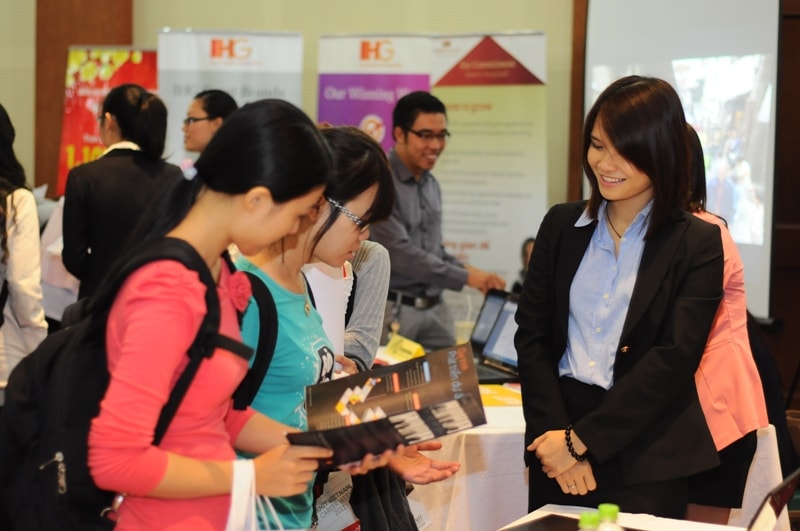How are RMIT students prepared for work?
(Baonghean) - According to a survey of global employers, RMIT University students ranked 60th in the world for job readiness after graduation.
 |
| RMIT University Vietnam students interact with businesses during Career Week |
Work readiness is one of the factors that determine a student’s ability to find a job and their starting salary after graduation. RMIT University has helped students prepare for work through proactive learning, practical experience and strong connections with the community.
The 30-hour rule
If knowledge is like bricks, then at RMIT University Vietnam, teachers are the ones who inspire and support students to lay each brick to build a foundation of knowledge. The 30-hour rule is the minimum time that students must spend each week to self-study, deepen their knowledge and complete tests and practical projects based on the suggestive lectures in class. Highly appreciated papers are those that have invested a lot of research effort, demonstrating the students' ability to analyze and argue.
When students encounter difficulties with their studies, they can go to their teachers for support. To help students develop independence and proactive problem-solving, teachers will not give direct answers but will suggest and ask questions so that students can reflect and find their own way. In addition, students who want to strengthen or improve their study skills can also go to the school's Learning Skills Support Center (LSU) to participate in classes teaching teamwork skills, analyzing and solving problems, searching for documents from many different sources, etc.
Studying in an environment that emphasizes initiative and independent problem-solving skills, RMIT students easily absorb new knowledge and quickly catch up with work.
Real-life experience at the club
In addition to the ability to proactively learn in all situations, RMIT students are also encouraged to accumulate
Seminar“The secret to successin the international university environment"To create conditions for parents and future students to learn about the majors and determine suitable careers with the advice of lecturers, chat with alumni and parents, RMIT University Vietnam will organize the event "Secrets to success in an international university environment" (including a free trial class of the English Program). Sunday, July 27, 2014, 9:00 - 12:00 at Muong Thanh Song Lam Hotel, No. 13 Quang Trung, Vinh City, Nghe An Please register to attend at: www.rmit.edu.vn/vi/biquyetthanhcong or call:(04) 3726 1460 / 0918 282 258 / 0905 939 898for more details. |
practical experience through various clubs and volunteer activities. Each semester, students can choose to join 65 clubs run by students themselves. Each club is a miniature organization on diverse topics of study, culture, sports, etc.
These clubs are always supported by the school and are given the opportunity to organize large-scale events and activities for the school community. The recent Clean Up Day environmental activity at Ngoc Khanh Lake - Hanoi, which was attended by a large number of students, is an example. SIFE Club members and Mr. Aiman Abousher, an Australian, lecturer in Economics & Finance at RMIT University, Hanoi, had a Green Sunday when participating in this meaningful activity; at the same time, helping people to be aware of the benefits of green space here.
Teamwork, planning and project implementation skills gained from the Club will help students confidently face and solve problems and not be surprised in the future work environment.
The “key” to the local market
An employee who can get up to speed quickly is someone who is aware of the local business and community landscape.
RMIT University Vietnam always supports students to strengthen their connections with local businesses through activities such as Career Week, field trips to businesses, talks with alumni working in the industry, etc. By cleverly taking advantage of these opportunities, many students have found jobs or internships while still studying.
With an understanding of the business landscape in the Vietnamese market, RMIT students quickly adapt and are able to provide solutions suitable for the local market, which is what multinational companies are looking for.
If knowledge is like bricks, then at RMIT University Vietnam, students are taught how to master the bricks of knowledge so that they can build their own future path based on practical experiences and understanding of the local market.






